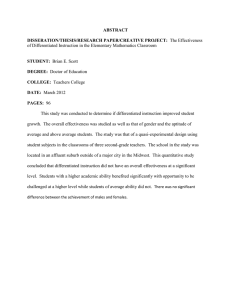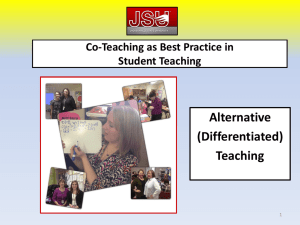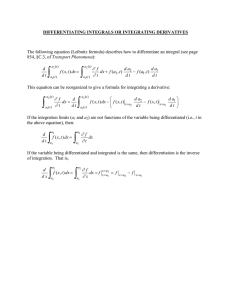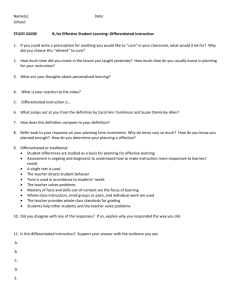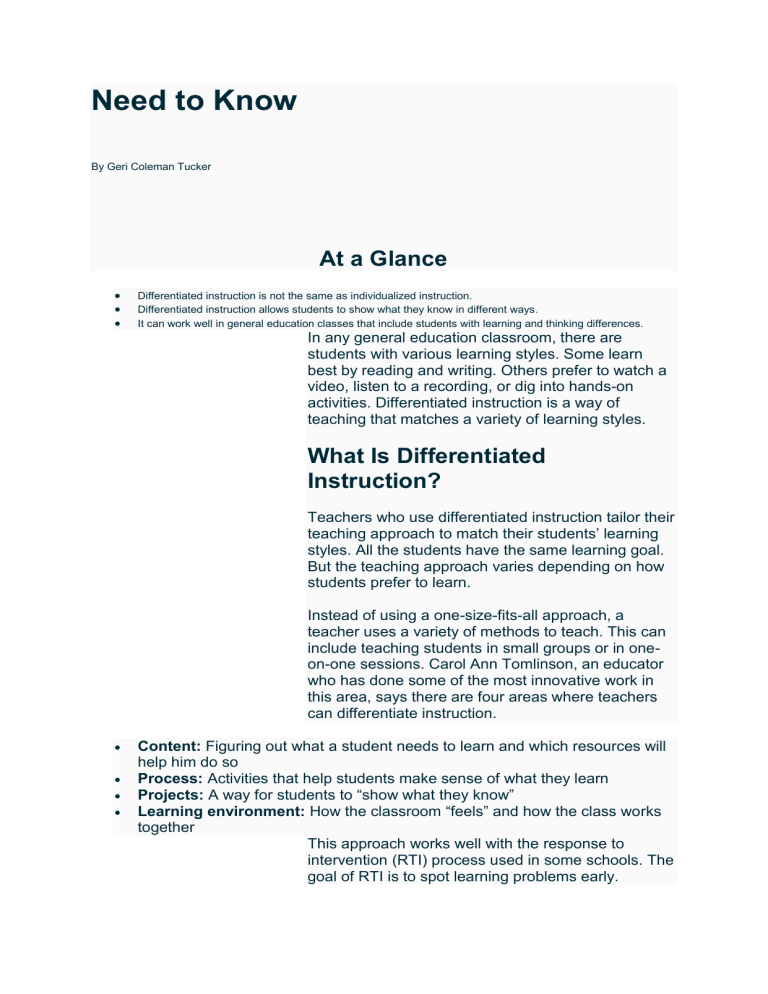
Need to Know By Geri Coleman Tucker At a Glance Differentiated instruction is not the same as individualized instruction. Differentiated instruction allows students to show what they know in different ways. It can work well in general education classes that include students with learning and thinking differences. In any general education classroom, there are students with various learning styles. Some learn best by reading and writing. Others prefer to watch a video, listen to a recording, or dig into hands-on activities. Differentiated instruction is a way of teaching that matches a variety of learning styles. What Is Differentiated Instruction? Teachers who use differentiated instruction tailor their teaching approach to match their students’ learning styles. All the students have the same learning goal. But the teaching approach varies depending on how students prefer to learn. Instead of using a one-size-fits-all approach, a teacher uses a variety of methods to teach. This can include teaching students in small groups or in oneon-one sessions. Carol Ann Tomlinson, an educator who has done some of the most innovative work in this area, says there are four areas where teachers can differentiate instruction. Content: Figuring out what a student needs to learn and which resources will help him do so Process: Activities that help students make sense of what they learn Projects: A way for students to “show what they know” Learning environment: How the classroom “feels” and how the class works together This approach works well with the response to intervention (RTI) process used in some schools. The goal of RTI is to spot learning problems early. Struggling students are given extra support before they fall behind their peers. Why Is Differentiated Instruction Used? Differentiated instruction “shakes up” the traditional classroom, says Tomlinson. Students have “multiple options for taking in information, making sense of ideas, and expressing what they learn,” she explains. Forty years ago, Tomlinson says, the focus was on individualized instruction. But teachers discovered that creating an individual learning plan for each student in a class wasn’t realistic. Differentiated instruction, on the other hand, uses several learning approaches. But it doesn’t require an individual approach for each student. All students have access to the curriculum in a variety of ways. This makes the whole learning experience more effective. How Differentiated Instruction Works Differentiated instruction can play out differently from one classroom to the next—and from one school to the next. However, the key features of this approach are: Small work groups: The students in each group rotate in and out. This gives them a chance to participate in many different groups. A group can include a pair of students or a larger group. But in all cases, it’s an opportunity for students to learn from each other. Reciprocal learning: Sometimes the student becomes the teacher, sharing what he’s learned and asking questions of his peers. Continual assessment: Teachers regularly monitor students’ strengths and weaknesses (in both formal and informal ways) to make sure they’re progressing well in their knowledge and mastery of schoolwork. Differentiated Instruction and Special Education A teacher uses differentiated instruction to give every student multiple paths to learning. That includes students who have Individualized Education Programs (IEPs) or 504 plans. It doesn’t replace the goals and objectives in a child’s IEP or 504 plan. Instead, the teacher personalizes her teaching to help the student meet those goals and objectives. What to Watch Out For Critics say differentiated instruction doesn’t work in every classroom. If there are too many students in a class, or if the teacher isn’t experienced with this approach, the classroom can become distracting and chaotic. Learn more about teaching strategies and techniques that help struggling learners. And find out more about the difference between individualized instruction and differentiated instruction.

